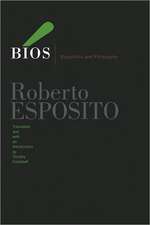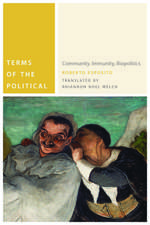Immunitas
Autor R Espositoen Limba Engleză Paperback – 13 oct 2011
Starting from this reflection on the nature of immunization, Esposito offers a wide-ranging analysis of contemporary biopolitics. Never more than at present has the demand for immunization come to characterize all aspects of our existence. The more we feel at risk of being infiltrated and infected by foreign elements, the more the life of the individual and society closes off within its protective boundaries, forcing us to choose between a self-destructive outcome and a more radical alternative based on a new conception of community.
Preț: 136.00 lei
Nou
26.03€ • 27.07$ • 21.49£
Carte disponibilă
Livrare economică 24 martie-07 aprilie
Livrare express 08-14 martie pentru 24.36 lei
Specificații
ISBN-10: 0745649149
Pagini: 200
Dimensiuni: 152 x 229 x 12 mm
Greutate: 0.35 kg
Editura: Polity Press
Locul publicării:Chichester, United Kingdom
Public țintă
Graduate students and academics in philosophy, literary studies, cultural studies.Cuprins
Introduction I. Appropriation
1. Ius proprium
2. Violence against violence
3. Double blood
4. Legal immunization
II. The katéchon
1. Sacer and sanctus
2. The restrainer
3. Political theology
4. Theodicy
III. Compensatio
1. Immunitary anthropology
2. The productivity of the negative
3. The risk of community
4. The power of the void
IV. Biopolitics
1. Incorporations
2. The phármakon
3. Zellenstaat
4. The governance of life
V. The implant
1. Biophilosophies of immunity
2. War games
3. The defeated
4. Common immunity
Recenzii
Political Studies Review
"AfterCommunitasandBios, here, at last, in Zakiya Hanafi′s wonderful translation is the centerpiece of Roberto Esposito′s biopolitical trilogy,Immunitas. In this work, Esposito offers the reader a stunning genealogy of the category of immunization, one no longer thought merely through the medical sciences, but across a series of disciplines, including law, political theology, philosophical anthropology, and biopolitics, all culminating in the the model of the transplant for imagining an immunization that might lead to ′the immune common.′ The result is a book whose innovation is matched only by its fearlessness. An absolute must read for anyone interested in thinking the future of life and politics in a biopolitical age."
Timothy C. Campbell, Cornell University
Descriere
This book by Roberto Esposito - a leading Italian political philosopher - is a highly original exploration of the relationship between human bodies and societies. The original function of law, even before it was codified, was to preserve peaceful cohabitation between people who were exposed to the risk of destructive conflict. Just as the human body's immune system protects the organism from deadly incursions by viruses and other threats, law also ensures the survival of the community in a life-threatening situation. It protects and prolongs life.
But the function of law as a form of immunization points to a more disturbing consideration. Like the individual body, the collective body can be immunized from the perceived danger only by allowing a little of what threatens it to enter its protective boundaries. This means that in order to escape the clutches of death, life is forced to incorporate within itself the lethal principle.
Starting from this reflection on the nature of immunization, Esposito offers a wide-ranging analysis of contemporary biopolitics. Never more than at present has the demand for immunization come to characterize all aspects of our existence. The more we feel at risk of being infiltrated and infected by foreign elements, the more the life of the individual and society closes off within its protective boundaries, forcing us to choose between a self-destructive outcome and a more radical alternative based on a new conception of community.












